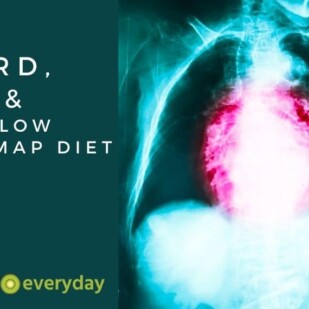We all know that sleep is generally important for our health, but did you know that it can impact your IBS?
In this article, I will explain how sleep impacts IBS and how you can optimize your sleep to improve your symptoms.
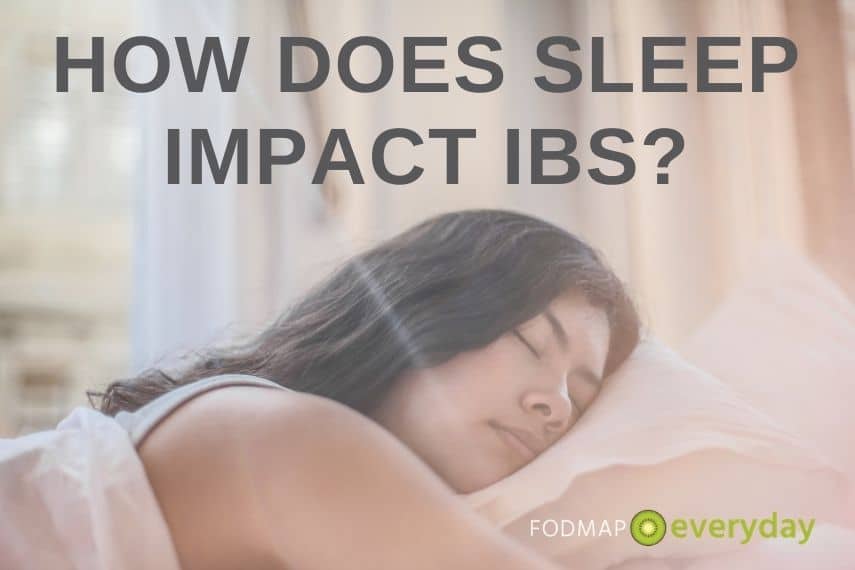
The Circadian Rhythm
The circadian rhythm is your sleep day-night cycle.
Optimally we would rise with the sun and go to bed as soon as it gets dark. This cycle is mostly governed by the sleep hormone melatonin, which is secreted from the pineal gland (1).
Melatonin is stimulated by the dark and suppressed by the light, so much of our sleep cycle is influenced by the time of day (2).
How Does Sleep Impact The Gut?
There have now been multiple studies looking at sleep cycle quality in relation to both IBS and the wider gastrointestinal system as a whole.
The circadian rhythm does not just impact when you go to sleep. In your gut, this sleep cycle can impact epithelial cell turnover, immune function, liver metabolism and peristalsis (how food moves along your gut) (3).
Increases in sleep disturbances are related to increased GI disturbances in general such as acid reflux and rectal sensitivity (6). There may also be a role for inflammatory responses as increased inflammatory markers have been seen in relation to poor sleep (7).
IBS & Sleep
Given the impact of your sleep cycle on your gut, it is not surprising that there is a link with your IBS as well.
Sleep disturbances can exacerbate visceral pain (4, 5). This means your nervous system will be sending more pain signals back to your brain if you have a disturbed night’s sleep.
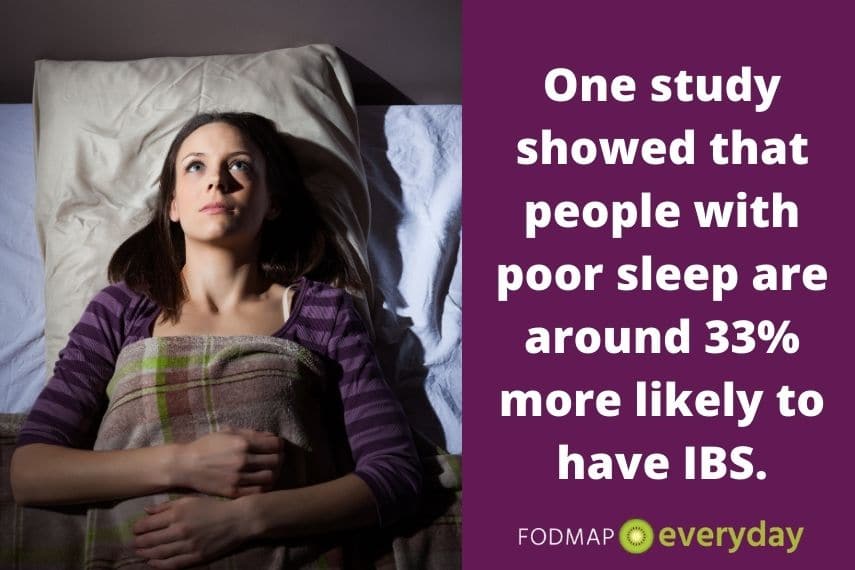
What about those late nights on the weekend? Do just 1 or maybe 2 nights count? Yes! Even after just 1 night of poor sleep, multiple studies have shown this unfortunate outcome (4, 9, 10).
Interestingly, simply getting enough overall sleep may not be good enough either as irregular sleep patterns have been linked to increase in abdominal pain (4).
Although we are not 100% sure yet what causes IBS to occur, sleep itself may be a factor. One study showed that people with poor sleep are around 33% more likely to have IBS (8).
Signs of Poor Sleep
As ‘time asleep’ alone does not indicate good sleep quality, it is important to identify when you have poor sleep. The following list gives you key indicators;
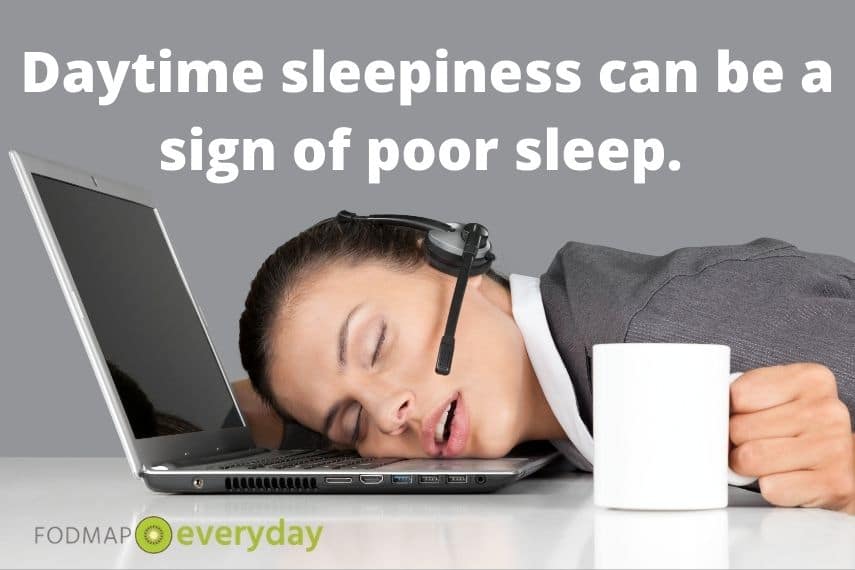
- Morning drowsiness
- Daytime sleepiness
- Snoring
- Waking through the night
How Much Sleep Do I Need?
The amount of sleep you need will vary with age and activity levels. Although below we give some guidance, it is important that you still monitor for any signs of poor sleep as the guidelines do give a range. Your requirements may also change over time.
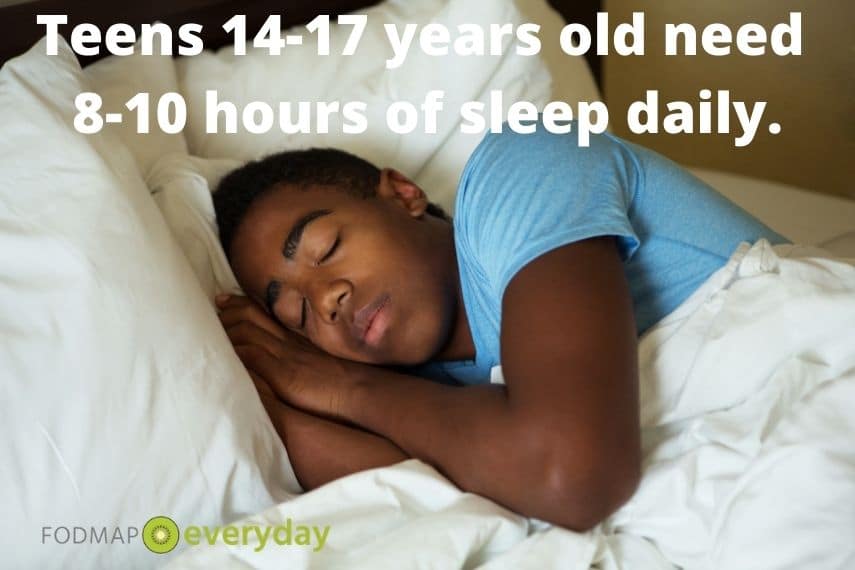
Based on the National Sleep Foundation’s Guidelines (11);
- Teen (14-17 years old): 8-10 hours
- Young adult (18-25 years old): 7-9 hours
- Adult (26-64 years old): 7-9 hours
- Older adult (65 or more years old): 7-8 hours
Tips For a Good Sleep
The tips below outline some good sleep hygiene habits. Try to implement as many as possible on a daily basis.
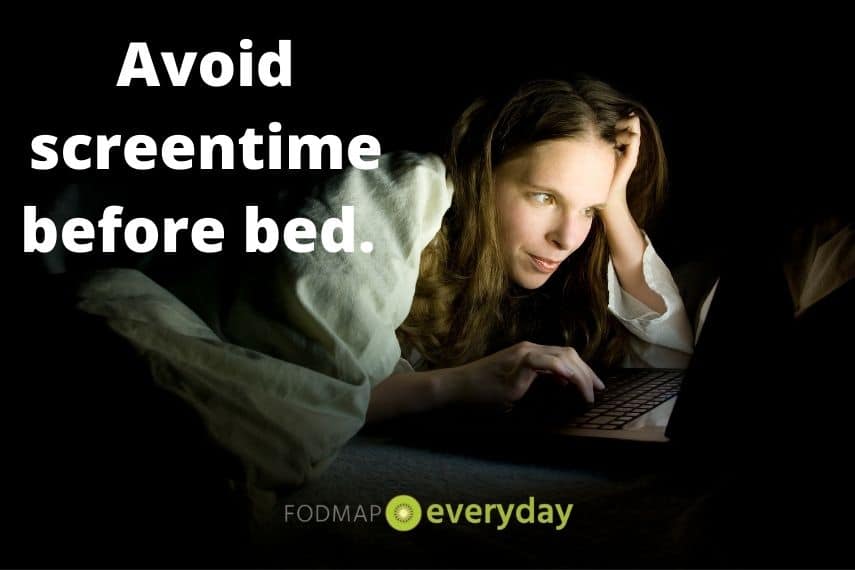
- Get out in natural daylight every day. This will help your melatonin levels.
- Keep regular sleep / wake times to allow the circadian rhythm to stabilize
- Avoid caffeine 8 hours before bed and do not consume more than 400mg a day.
- Exercise during the day rather than before bed.
- Avoid eating right before bed, or going to bed hungry – both make it difficult to sleep.
- Drink fluid throughout the day rather than rushing to meet your requirements and then being up all night making trips to the bathroom.
- Avoid alcohol – this can make you sleepy, but it actually disrupts the sleep cycle.
- Ensure your bedroom is set up for sleep – dark, cool and quiet.
- Avoid screen time before bed. And if you must engage in screen time adjust your monitor to diminish blue light or purchase blue light blocking glasses.
- Trouble falling asleep? There are apps available that can help you fall asleep more easily – utilizing meditation, story telling and calming sounds or music. A popular app is called Calm.
- Melatonin has been determined to provide support for those who struggle to fall asleep and may help in decreasing pain as well as encouraging relaxation. (12)
- How old is your bed? Most beds have a lifespan of 7 to 10 years. If yours is older, or if you have noticed a change in its support, it might be time to go bed shopping. The right bed for your style of sleeping can greatly affect how well rested you will be.
The Takeaway
Poor quality and quantity of sleep have been directly linked to an increased risk of IBS and worsening of symptoms. In addition, irregular sleep patterns have also been linked regardless of how many hours you get each night.
Following good sleep hygiene routines is important and should be considered as highly as nutrition when tackling IBS.
Stress & IBS
Stress is often a co-factor with IBS. IBS can create stress, and stress can trigger IBS symptoms. If this is true for you, please check out our article on IBS & Stress.
References
- Ballou S, Alhassan E, Hon E, et al. Sleep disturbances are commonly reported among patients presenting to a gastroenterology clinic. Dig Dis Sci 2018; 63: 2983–91
- https://pubmed.ncbi.nlm.nih.gov/32416862/
- Gombert M, Carrasco -Luna J, Pin -Arboledas G, Codoñer-Franch P. The connection of circadian rhythm to inflammatory bowel disease. Transl Res 2019; 206: 107–18.
- Schey R, Dickman R, Parthasarathy S, et al. Sleep deprivation is hyperalgesic in patients with gastroesophageal reflux disease. Gastroenterology 2007; 133: 1787–95.
- Orr WC, Raad S. Assessment of sleep in clinical practice. In: Johnson DC, Orr WC, Ware JC, Parekh PJ, Oldfield EC, eds. Sleep effect on gastrointestinal health and disease: translational opportunities for promoting health and optimizing disease management. New York: Nova Science, 2018.
- Cremonini F, Camilleri M, Zinsmeister AR, Herrick LM, Beebe T, Talley NJ. Sleep disturbances are linked to both upper and lower gastrointestinal symptoms in the general population. Neurogastroenterol Motil 2009; 21: 128–35.
- Scheer FA, Hilton MF, Mantzoros CS, Shea SA. Adverse metabolic and cardiovascular consequences of circadian misalignment. Proc Natl Acad Sci USA 2009; 106: 4453–58.
- Vege SS, Locke GR 3rd, Weaver AL, Farmer SA, Melton LJ 3rd, Talley NJ. Functional gastrointestinal disorders among people with sleep disturbances: a population -based study. Mayo Clin Proc 2004; 79: 1501–06.
- Buchanan DT, Cain K, Heitkemper M, et al. Sleep measures predict next -day symptoms in women with irritable bowel syndrome. J Clin Sleep Med 2014; 10: 1003–09.
- Patel A, Hasak S, Cassell B, et al. Effects of disturbed sleep on gastrointestinal and somatic pain symptoms in irritable bowel syndrome. Aliment Pharmacol Ther 2016; 44: 246–58.
- https://pubmed.ncbi.nlm.nih.gov/29073412/
- https://www.ncbi.nlm.nih.gov/pmc/articles/PMC3949259/

